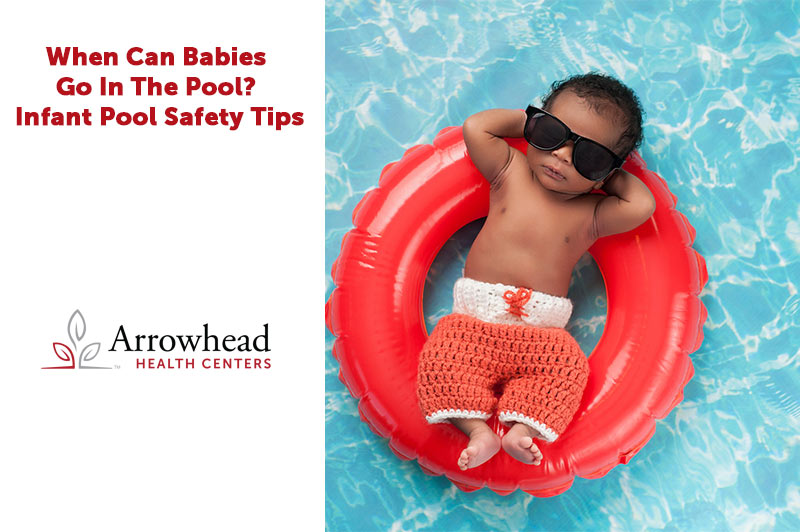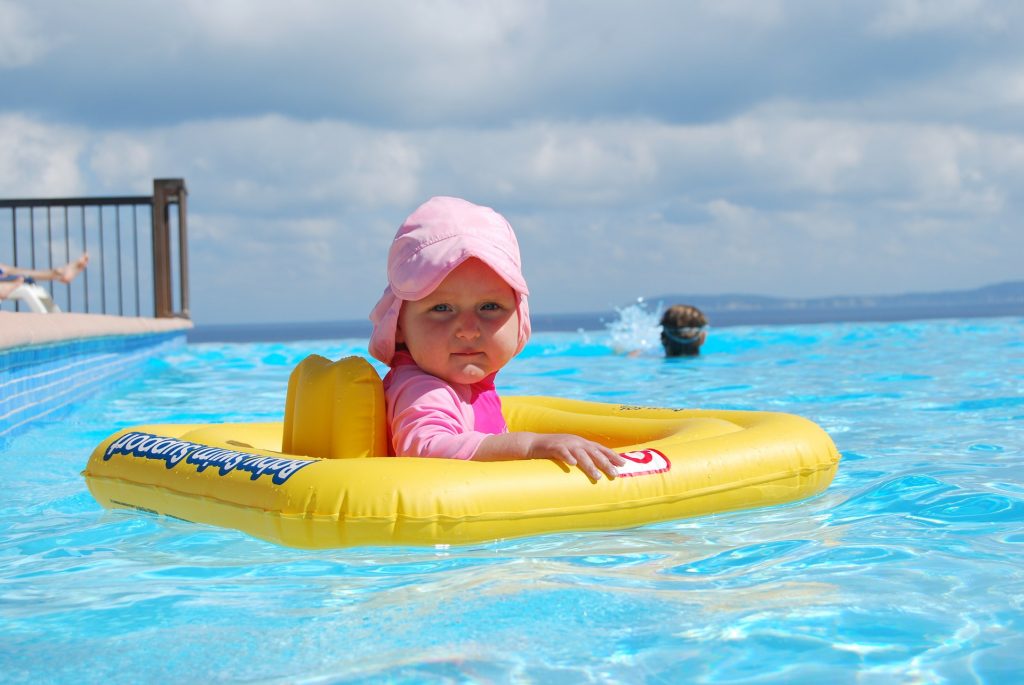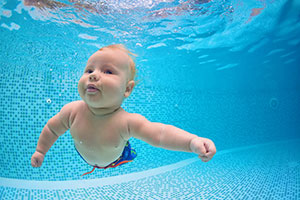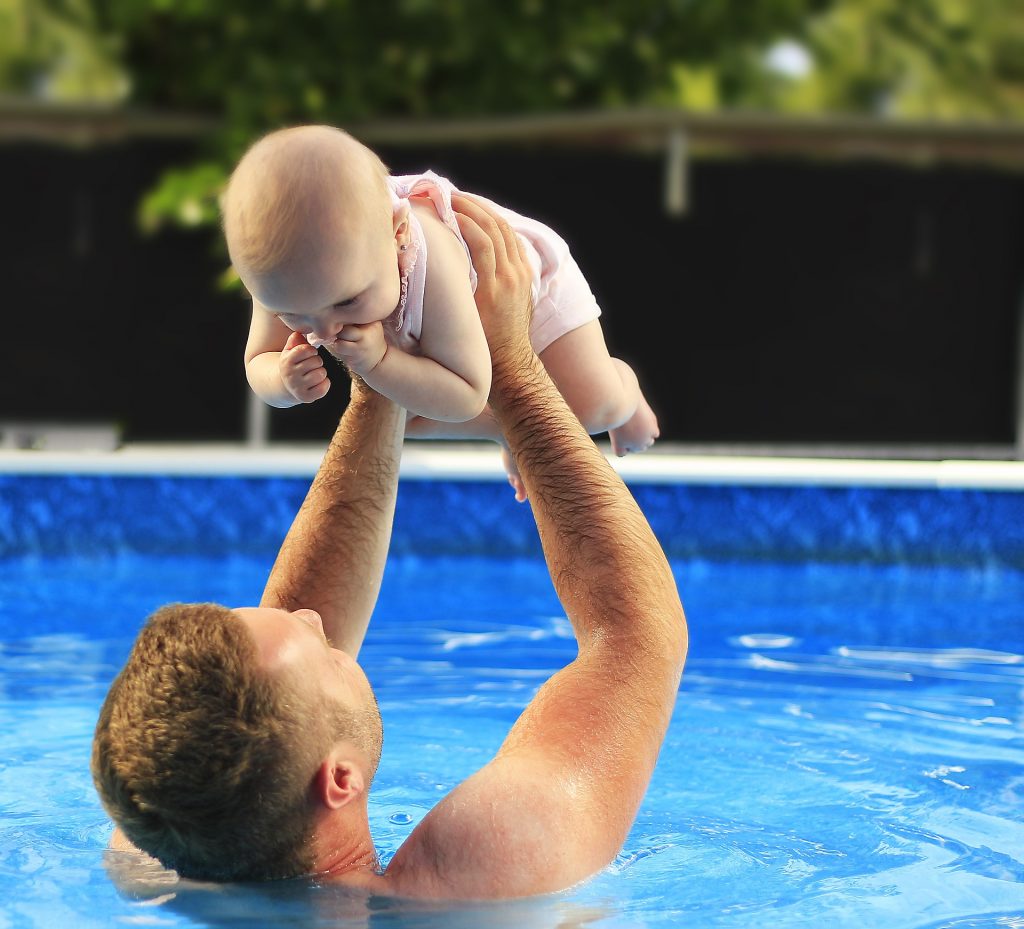The list can include harsher chemicals, such as acid. You also have to take some things into account.

Pin On Pool Spa Maintenance
Hot tubs, spas, and pools heated to more than 100 degrees fahrenheit are off limits to children younger than 3.

When can my baby go in a chlorine pool. These are generally quite mild and should not stop you taking your baby swimming. If your baby is younger than 6 months, make sure the pool is heated to about 32° c. It is important to remember chlorine and other pool disinfectants do not kill germs instantly, and not all pools and hot tubs have a proper disinfectant level 5, 6.
It does not matter if they have not yet completed their course of vaccinations. For your baby to be comfortable, the temperature of pool water should be between 85 and 87 degrees fahrenheit. It is important to monitor the levels in your pool.
Most parents do wait until their newborn is at least 2 weeks old however. Condition your baby on what to expect: When my lo had it bad, i would cream him up before swimming, but put a sun suit or wetsuit over the top.
I would try your lo in the pool first, see if it flares up. So if you get into a swimming pool, germs can go from your skin into the water. However, your baby can go swimming at any time from birth, although most baby swimming classes start at around six weeks.
As a rule of thumb, if it's something you would expose your baby to, then it's something you can do if you're breastfeeding. Therefore, it’s generally best to wait until your baby is around 2 months old before you take them swimming. If you do use a chlorinated pool, you could take your baby swimming just once a week to reduce her exposure.
Pool chemicals can dry the skin. For example, if you’ve had diarrhoea, germs can still be on your skin even if you’ve cleaned your bottom and hands really well. When most canines see a pool, they may see a huge water bowl.
If your bub has sensitive skin you probably would want to hold it off a bit because the chlorine in the water can irritate thier skin. If he starts shivering, it's time to get out. My local pool won't let babies under 6 months swim.
When is it safe to take a newborn in a chlorine pool? Apply your child’s moisturizer or a layer of. When you get out, be sure to wrap your baby in a warm blanket or towel immediately.
Babies younger than 12 months. These chemicals go beyond just chlorine. Exposure to water should be like feeding schedules:
Be an opportunity for bonding as you play together in the water. The centers for disease control (cdc) do not recommend children under 5 years use a hot tub or spa. Guidelines for introducing a baby to a chlorine pool.
So in this light, proper pool sanitization is healthy and necessary. Chlorine levels, acidity, ph levels and so on. This can happen quite easily.
You don’t have to wait until your baby is immunised to take them swimming. Young children overheat more quickly than adults, and the high temperatures in hot tubs can cause. The chlorine in the pool can't reach your breastfeeding baby in any significant amount.
Before your child gets in the water: Yes, swimming in a chlorinated pool is fine for breastfeeding moms. You can usually enter this stage between one and two months of age.
Only put the cream where the suit will cover, or it will make him slippery and dangerous in the pool. I took dd at 4months in my dads pool because he doesn't put much chlorine in it and it is solar heated. Your baby’s immune system is not as developed as an older sibling’s or a parent’s, so decreasing.
Such as, how busy the pool is, the temperature of the water, and whether the pool is indoors or outdoors. Unless a chlorine allergy exists, there is no reason why a newborn baby cannot go into a chlorinated swimming pool. If you allow your child to use a hot tub or spa, keep the visit supervised and brief, and don't allow your child to put his or her head underwater.
Although a chlorinated pool may help keep adults and older children safe from sickness, is it safe for your baby? Look for a chlorine level of 3 to 10 (or a bromine level of 4 to 8), and a ph of 7.2 to 7.8. With a few precautions, however, most kids who have eczema can enjoy the pool.
The chlorine water itself does not. If you're keen for your baby to be introduced to swimming before he is six weeks old If the levels are too low, bacteria and algae can form in the pool, which can lead to potential health problems, especially for infants and toddlers.
In fact, swimming is great postpartum exercise. Counting 1, 2, 3, taking a deep breath, and pouring water over. Don’t keep your baby in the pool water for longer than 10 minutes at first.
Make sure to prohibit licking or drinking the pool water, as this could cause other issues. Dirt, food and other solids that end up in the pool. It can also be dangerous if the water is too hot.
If your baby does have asthma, and her symptoms seem to be triggered by spending time in a swimming pool, talk to your asthma nurse for further advice. This takes all the fun out of swimming!you want your baby to love their swim lesson experience, so taking your time is the best approach for them to feel happy and secure. Although chlorine is considered “safe” for newborns, it still has some risks.
It is typically recommended that babies have all initial immunizations completed, typically 4 to 5 months old. At other times, kids who have eczema can enjoy the pool. Get him accustomed to being in a pool.
You still have to make sure your baby is old enough before he or she ventures into the pool. Once baby is comfortable with water in the shower and tub, it’s time to graduate from to the pool. There's no need to wait until your baby is immunised.
Help him get over any fears he. Long hair can get caught in an uncovered hot tub grate and cause drowning. (the pool & hot tub alliance recommends keeping children out of hot tubs until they're older and can stand on the bottom with their heads completely out of the water.
If you like and trust water, he’s likely to trust it. If you do plan to swim, make sure to test the water for proper chlorine and ph levels and bathe before and after swimming with a moisturizing wash to prevent babies skin from drying out. Anytime you are going to pour water over the baby’s head or face, use a signal to let them know you’re going to do this.
You can take your baby swimming at any age, both before and after they have been vaccinated. Babies sometimes experience side effects after a vaccination.

Chlorine And Babies - When Is It Ok To Take A Newborn In A Chlorine Pool How To Have Twins Twin Babies Newborn Twins

When Can Babies Go In The Pool Infant Pool Safety Tips Redirect Health Centers

Is A Chlorine Pool Safe For Babies

Chlorine And Babies - When Is It Ok To Take A Newborn In A Chlorine Pool Pool Chlorine Baby Pool Baby Pool Floats

10 Cool Products That Make Summer Travel Easier Water Baby Carrier Summer Baby Wishes For Baby

Pin By Mehtap Danisir On Cute Underwater Photography Underwater Photos Baby Swimming

Is Chlorine Safe For Babies To Drink Or Not To Drink Tyent Usa Baby Safe Baby Chlorine

Science Of Summer How Chlorine Kills Pool Germs Swimming Safety Summer Survival Parenting

When Can Babies Go In The Pool Infant Pool Safety Tips Redirect Health Centers

Infant Self-rescue Courses Teach Baby To Swim Alone Teach Baby To Swim Baby Swimming Underwater Pictures

We Adjust To Seeing Underwater Faster Kids Swimming Baby Swimming Baby Swimming Lessons

Use A Chlorine Sanitizer In A Kiddie Pool Keeps Pool Clear For Days No More Draining And Filling Every Other Day Kiddie Pool Pool Summertime Fun

Protect Babys Skin While Swimming Baby Protection Baby Skin Baby Swimming

Does Chlorine Irritate Diaper Rash Diaper Rash Baby Rash Baby Diaper Rash

Chlorine And Babies - When Is It Ok To Take A Newborn In A Chlorine Pool Baby Swimming Lessons Pool Chlorine Baby Swimming

Baby Swimming Baby Swimming Underwater Painting Underwater

Water Babies Society Theguardiancom Kids Swimming Baby Swimming Swim Lessons
Are Chlorine Pools Safe For Babies

Is A Chlorine Pool Safe For Babies
